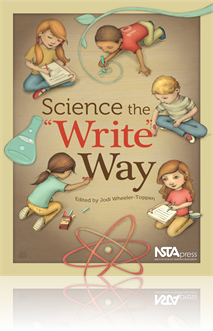All Book Chapters
Book Chapter
Science the "Write" Way: Nonfiction Writing Activities Help Students Learn Science
Learning to write well is a long process that comes through teacher modeling, instruction, practice, and feedback. Luckily, the writing process can be used to improve science learning too. This chapter describes how nonfiction writing activities help...
Book Chapter
For middle school students, writing a formal lab report can be challenging. For middle level teachers, reading students’ lab reports can be overwhelming. As a solution, why not try peer editing? By having students critique each other in a construct...
Book Chapter
Would you like your students to learn about nature and improve their observational abilities? Incorporating haiku into your curriculum can help meet these science goals and give children a positive writing experience as they learn about the world aro...
Book Chapter
A current events journal keeps students involved with the latest scientific news and helps develop their writing and analytical skills. Every week, students select a science article, summarize the article in their journals, and define new vocabulary....
Book Chapter
Extra! Extra! Learn All About It
Communication and reporting of findings to peers are important to middle school students. One way to capitalize on students’ interests and incorporate the nature of science into the science curriculum is to have students create a science-based news...
Book Chapter
Having students write and publish their own newsletters is a great way to integrate reading and writing, infuse technology, and build home-school relationships. These newsletters can be used to keep parents informed of what is being taught in class, ...
Book Chapter
The typical use of science notebooks is for students to record information as they complete an investigation, writing down their procedure, observations, data, results, graphs, and any other factual information pertaining to their experiment. The aut...
Book Chapter
A Natural Integration: Student-Created Field Guides Seamlessly Combine Science and Writing
A five-week study taught students how to write a field guide that identified the plants in a small wooded area they passed through on their way to their school playground. By creating this authentic genre of science writing, students came to understa...
Book Chapter
Richard Louv’s Last Child in the Woods (2008) added to a growing consensus to get children outside and experiencing nature. Using ideas from place-based education, the authors present a simple year-long project that brings science, nature, and ot...
Book Chapter
Are you looking for ways to effectively integrate—and assess—science and literacy learning? Try having your students create their own books! The Integrated Science Literacy Enactments (ISLE) approach to teaching and learning science is one way to...
Book Chapter
Developing writing skills along with content by incorporating hands-on science experiences and related writing lessons provides students with a purpose for writing, which makes it more meaningful to students. The Mystery Box lesson discussed in this ...
Book Chapter
Unlocking Reading Comprehension with Key Science Inquiry Skills
As secondary science teachers, we must remember that scientific literacy cannot be attained without fundamental literacy--the ability to read and comprehend textual information and write competently about the subject under study. To achieve literacy ...
Book Chapter
What do we learn from the world around us? After months of exploring various ecosystems, a third grade teacher incorporates "Nature's Advice Book", a writing tool created to assess what her students had learned and to gain insight into their ideas ab...
Book Chapter
Third-grade students display their understanding of life science concepts by creating an imaginative newspaper. This creative writing project engages students in researching, writing, and editing a newspaper based on a prairie ecosystem....
Book Chapter
Two Bad Ants, a fictional story detailing the journey of “two bad ants” that stray from their colony and choose to stay in a container full of large, white, sweet-tasking crystals (sugar)—was the catalyst for an engaging five-day study with thi...


